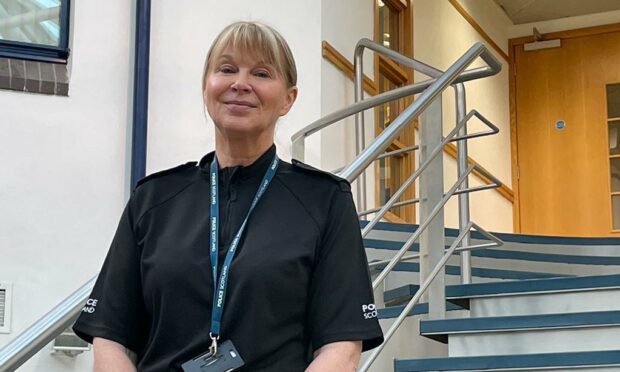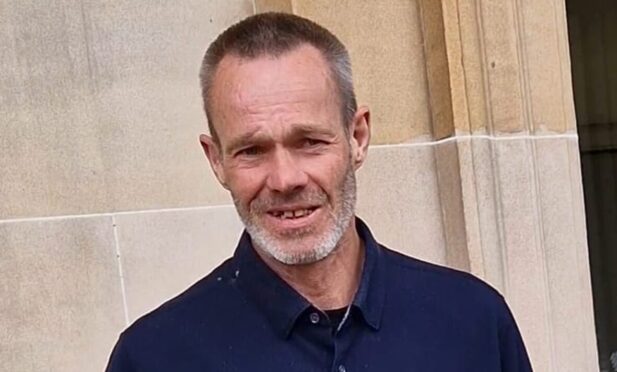When she joined the police force aged 22, Irene Ralston was told by her boss she would have to wear a skirt during the day and was handed a handbag and a baton about half the size of those used by her male colleagues.
Now, as she retires 35 years on as the longest-serving female police officer in Fife division, the Superintendent reflects on her rise through the ranks and role in encouraging more women to join the force.
Before joining the Lothian and Borders Police as a constable on February 9, 1987, Irene worked in a bank, the fiscal service and was an air stewardess for Gulf Air.
She told The Courier: “I tend to get bored quickly with some occupations so thought I could do a lot of different things and learn a lot of new skills in the police.”
Criminals ‘more interesting’
Speaking about some of the biggest changes she has seen in her time in the force, Irene said: “Criminals have got a bit more interesting in terms of how they operate.
“They are a bit more sophisticated now than they were in the earlier days.
“I think a woman’s role has changed quite a bit as well.
“Back in 1987 when I joined you were issued with a skirt and you were only allowed to wear your trousers on the night shift.
“My specific chief superintendent did not like you wearing trousers.
“Then you were issued with a handbag and a tiny wee baton which was a different size to the men’s baton.
“It wasn’t long after I started that these things did start to change.
“Every division within the country probably worked differently because we were all different forces.
“There weren’t a lot of women role models at that time, either in terms of aspiring to develop within the career structure.
“I think when you look at society, we’re made up of roughly 50/50 (men and women) so you need that within the police as well.
“If you’re going to be delivering a service to the community, then we really should be made up of people from the community.
“Everybody has got their own life experience to bring to the table as well and it’s the same with folk from an ethnic background.
“We need to be more diverse and to ensure we’re actually able to represent everybody.
“That will give people from the community a belief they will get that service because obviously they’re represented.”
Childcare forced women from police
Irene, who spent much of her career working in Edinburgh, was later promoted to sergeant and then worked as a training instructor at the Scottish Police College for three years.
She was selected to work on a project called the “gender agenda” to promote women in the organisation as they were underrepresented, particularly in areas such as road policing, firearms and CID.
Irene said: “Women often used to leave the service at around the 12 to 13 year mark.
“We invest a lot of money into our people so to leave at that juncture, you’ve spent a lot of money on people who are just wanting out of the organisation.
“It (the programme) was about looking at childcare and the catalyst for that decision, because obviously if you can support people to work then they will stay in work.
“It was often to do with their childcare situation and maybe the job was not quite as flexible at the time.
“I think there are more and more women joining the force and it’s really welcome because we need a diverse workforce but I’m still finding there are fewer women of rank within the organisation.
“There has been national work ongoing for years in relation to tackling that.”
After 18 months on the gender agenda programme, Irene went on to become a custody sergeant in the cells before working for professional standards dealing with complaints about the police for about three years.
She was promoted to inspector in 2007 and before moving to Fife division in 2015 as chief inspector, she and a number of Saughton prison staff won a Butler Trust award for work on preventing contraband getting into the jail.
She was the area commander for Dunfermline and spent time working with the community and investing in people strategies to ensure officers were being given the right development opportunities.
Career for all
Irene said she would encourage anyone to join the police and says there is a lot of opportunity for people to develop their skills and challenge themselves.
She said: “You can be in CID, stay in response or the uniform side, you can do drugs type work, or look at the public protection side and managing risk and protecting vulnerable people.
“You’ve got firearms, you’ve got operational support who have the horses, you’ve got the dogs, you’ve even got the boat and marine unit too.
“I think people will find a niche and then, if there’s investment in people to appraise them and develop them then people get opportunities to act as a supervisor and that then leads to their development and promotion as well.”
Right time to retire
For her retirement, she plans to relax and go on some holidays which were booked in 2020 but have been delayed due to the Covid pandemic.
She said: “I will miss it and it’s taken me a long time to come to this decision because even when I made the decision I was swithering for so long.
“I now think it’s the right time for me to go.
“I think I’ll miss the people, I’ll miss the job, I’ll miss the buzz of it all because it’s a really busy job but there will be plenty of others there who’ll be hoping to do the same as me.
“I’ve had an absolute ball and loved every minute of my 35 years.
“I’ve no complaints at all. It’s a fantastic career and I would recommend it to anybody.”











